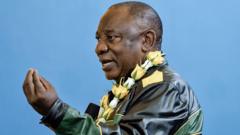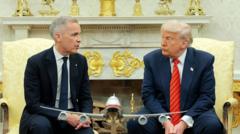Cyril Ramaphosa's upcoming White House visit is seen as pivotal in restoring trade relations and addressing tensions with Trump.
Can South Africa’s Cyril Ramaphosa mend his ties with Donald Trump?

Can South Africa’s Cyril Ramaphosa mend his ties with Donald Trump?
A critical diplomatic meeting between South Africa’s President and the US leader.
In a landmark diplomatic effort, South Africa's President Cyril Ramaphosa is set to meet with US President Donald Trump at the White House, marking a significant moment for South Africa amid challenging relations. Previously the chief negotiator for Nelson Mandela’s African National Congress, Ramaphosa brings a wealth of experience, yet this meeting will demand all his diplomatic skills.
Ramaphosa aims to repair the strained relationship between the two nations, especially after months of discord that saw Trump make controversial claims regarding the safety of white South Africans. Despite the silence from the White House about the visit, Ramaphosa stated in Washington, "The trade relations are what's most important...We want to strengthen those relations."
The backdrop of this meeting includes tensions from recent legislative actions in South Africa, such as the controversial land expropriation bill signed by Ramaphosa, which has displeased the Trump administration. This legislation allows for government acquisition of land without compensation under certain conditions, which has contributed to a narrative of crisis promulgated by Trump and his advisors, heightening diplomatic rifts.
Political analysts predict the meeting could yield two outcomes: a successful breakthrough in negotiations or a quick unraveling if emotional rhetoric surrounding white South African grievances dominates the discussion. The stakes are high for Ramaphosa, who seeks to affirm South Africa's right to pursue its policy agenda while also addressing US concerns.
Dr. Lubna Nadvi, a political analyst from South Africa, expressed optimism that direct dialogue could lead to strengthening ties, noting that this meeting is an opportunity to clarify misperceptions that have led to diplomatic tensions. Ramaphosa’s spokesperson highlighted hopes for this visit to pave the way towards normalizing relations and enhancing trade agreements.
The meeting agenda may center on discussions surrounding the African Growth and Opportunity Act (Agoa), key for South African exports, and the possibility of extending its provisions that support African economies through duty-free access to US markets. South Africa is currently a significant exporter under this act, generating billions in revenue.
As preparations for the meeting continue, members of Ramaphosa's delegation, including notable public figures such as professional golfers, hint at an intent to forge personal connections that may aid in diplomacy. Despite the challenges, officials maintain that South Africa approaches the meeting with a stance of confidence—not as a supplicant but as a partner with valuable resources for the US.
As uncertainties loom, the diplomatic landscape remains fluid. Ramaphosa's visit is not merely about addressing grievances, but potentially redefining a key partnership that holds mutual benefits for both nations amidst shifting global dynamics.
Ramaphosa aims to repair the strained relationship between the two nations, especially after months of discord that saw Trump make controversial claims regarding the safety of white South Africans. Despite the silence from the White House about the visit, Ramaphosa stated in Washington, "The trade relations are what's most important...We want to strengthen those relations."
The backdrop of this meeting includes tensions from recent legislative actions in South Africa, such as the controversial land expropriation bill signed by Ramaphosa, which has displeased the Trump administration. This legislation allows for government acquisition of land without compensation under certain conditions, which has contributed to a narrative of crisis promulgated by Trump and his advisors, heightening diplomatic rifts.
Political analysts predict the meeting could yield two outcomes: a successful breakthrough in negotiations or a quick unraveling if emotional rhetoric surrounding white South African grievances dominates the discussion. The stakes are high for Ramaphosa, who seeks to affirm South Africa's right to pursue its policy agenda while also addressing US concerns.
Dr. Lubna Nadvi, a political analyst from South Africa, expressed optimism that direct dialogue could lead to strengthening ties, noting that this meeting is an opportunity to clarify misperceptions that have led to diplomatic tensions. Ramaphosa’s spokesperson highlighted hopes for this visit to pave the way towards normalizing relations and enhancing trade agreements.
The meeting agenda may center on discussions surrounding the African Growth and Opportunity Act (Agoa), key for South African exports, and the possibility of extending its provisions that support African economies through duty-free access to US markets. South Africa is currently a significant exporter under this act, generating billions in revenue.
As preparations for the meeting continue, members of Ramaphosa's delegation, including notable public figures such as professional golfers, hint at an intent to forge personal connections that may aid in diplomacy. Despite the challenges, officials maintain that South Africa approaches the meeting with a stance of confidence—not as a supplicant but as a partner with valuable resources for the US.
As uncertainties loom, the diplomatic landscape remains fluid. Ramaphosa's visit is not merely about addressing grievances, but potentially redefining a key partnership that holds mutual benefits for both nations amidst shifting global dynamics.


















